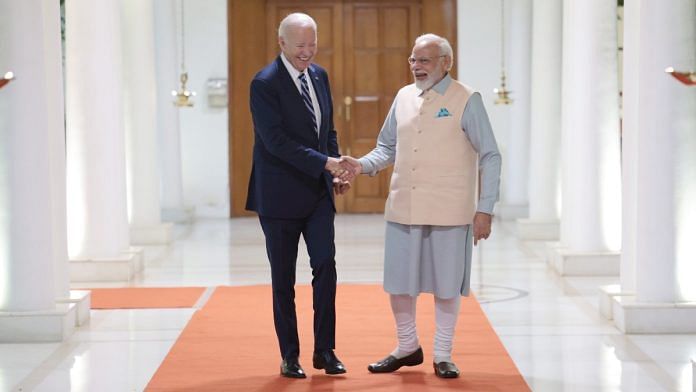New Delhi: US Backing for a reformed United Nations Security Council (UNSC) with India as a permanent member, congratulations for Chandrayaan-3, and a status check on matters discussed during PM Narendra Modi’s official state visit to Washington in June — these were among the highlights of PM Modi’s bilateral Friday with US President Joe Biden on the sidelines of G20.
“The leaders expressed their appreciation for the substantial progress underway to implement the groundbreaking achievements of Prime Minister Modi’s historic June 2023 visit to Washington,” the joint statement issued after the bilateral meeting said.
These include cooperation in space, the commercial agreement between GE Aerospace and HAL to manufacture GE F-414 fighter jet engines in India, and Delhi’s plans to procure General Atomics’ MQ-9B remotely piloted aircraft.
Biden, the statement said, welcomed the “issuance of a Letter of Request from the Ministry of Defence of India to procure 31 General Atomics MQ-9B (16 Sky Guardian and 15 Sea Guardian)… and their associated equipment, which will enhance the intelligence, surveillance and reconnaissance (ISR) capabilities of India’s armed forces across all domains”.
Also a part of discussion was the joint task forces set up on advanced telecommunications, “focused on Open RAN (Radio Access Network) and research and development in 5G/6G technologies”.
The leaders welcomed the MoU “between the Bharat 6G Alliance and the Next G Alliance operated by (US’) Alliance for Telecommunications Industry Solutions, as a first step towards deepening public-private cooperation between vendors and operators”.
Alliance for Telecommunications Industry Solutions is a US-based organisation that develops technical and operational standards for the global telecommunications industry.
Modi and Biden reiterated their cooperation in the quantum domain, welcoming the participation of S.N. Bose National Centre for Basic Sciences, Kolkata, as a member of the Quantum Economic Development Consortium (QED-C), which aims to enable and grow the quantum industry.
The two leaders had in June indicated that India would be participating in QED-C.
The two leaders also noted that the Indian Institute of Technology – Bombay (IIT-B) has “joined the Chicago Quantum Exchange as an international partner”.
The two leaders also discussed the India-US Initiative on Critical and Emerging Technologies [iCET], which envisages removing barriers for collaboration, including in defence.
The statement said the two sides will undertake a “midterm review of iCET” in September 2023, saying the two national security advisers will hold an annual review in early 2024.
President Biden is in India for the two-day G20 Summit being held under Indian presidency. This is his first visit to India.
Also Read: As Delhi locks down for G20, food delivery executives left in lurch. ‘Have to work every day to eat’
Space
The two leaders, according to the joint statement, welcomed efforts “towards establishment of a working group for commercial space collaboration under the existing India-US Civil Space Joint working group”.
Biden also congratulated “Prime Minister Modi and the scientists and engineers of the Indian Space Research Organisation (ISRO) on Chandrayaan-3’s historic landing at the south polar region of the Moon, as well as the successful launch of India’s first solar mission, Aditya-L1”.
Further, the two leaders announced that ISRO and NASA have begun discussions on “modalities, capacity building and training” for launching a joint effort to the International Space Station (ISS) in 2024.
Another initiative decided on in June and touched upon in this statement was cooperation in human spaceflight.
“[The two countries] are continuing efforts to finalise a strategic framework for human spaceflight cooperation by the end of 2023,” the statement issued Friday said.
India and the US will be increasing “coordination” on planetary defence to “protect planet Earth and space assets” from the impact of asteroids and near-Earth objects, with Biden also promising support for India’s participation in asteroid detection and tracking via the Minor Planet Center — the official body for observing and reporting on minor planets under the International Astronomical Union (IAU).
Nuclear energy
The two leaders “welcomed intensified consultations between the relevant entities on both sides to expand opportunities for facilitating India-US collaboration in nuclear energy, including in development of next-generation small modular reactor technologies in a collaborative mode”.
The US also reaffirmed its commitment in engaging with “like-minded” partners to advance India’s membership in the Nuclear Suppliers Group (NSG), a multilateral nuclear export control regime consisting of 48 participating governments.
India is not an NSG member because it has refused to sign the Nuclear Non-Proliferation Treaty — the US has backed an exception being made for India, but China opposes the idea.
The two leaders also pledged to sustain high-level engagement between India and the US for the “global good” that would “contribute to a free, open, inclusive and resilient” Indo-Pacific.
Trade
The statement said that the last of the seven outstanding disputes between India and the US had been settled in the World Trade Organisation (WTO). In June, the two leaders had announced the resolution of the remaining six.
(Edited by Sunanda Ranjan)
Also Read: From jet engines to drones, space and 6G – Big takeaways from PM Modi’s US visit



